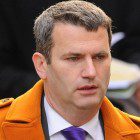Index relies entirely on the support of donors and readers to do its work.
Help us keep amplifying censored voices today.
 The UK has a press-controlled state rather than a state-controlled press. Phone hacking lawyer Mark Lewis reports on lessons from Leveson
The UK has a press-controlled state rather than a state-controlled press. Phone hacking lawyer Mark Lewis reports on lessons from Leveson
 To improve the culture, practice and ethics of the press, we must protect and promote the best of journalism. Alan Rusbridger makes the case for a new settlement
To improve the culture, practice and ethics of the press, we must protect and promote the best of journalism. Alan Rusbridger makes the case for a new settlement
 Tougher legislation will lead to judges becoming censors, says political blogger Guido Fawkes
Tougher legislation will lead to judges becoming censors, says political blogger Guido Fawkes
Nick Clegg’s former Parliamentary Private Secretary has said News International threatened to “turn against” the coalition if its parent company News Corp’s £8bn bid for control of BSkyB were referred to Ofcom.
Quoting from a note of an October 2010 meeting with News Corp lobbyist Frederic Michel, Norman Lamb MP said that News Corp would have “turned nasty” if business secretary Vince Cable, then responsible for handling the bid, referred it to the broadcast regulator.
Lamb said he took Michel’s comments to mean “very clearly that positive coverage he said they had given might change.”
The note, read out by Lamb and posted on the Inquiry website this afternoon, read:
0900 meeting Fred Michel News International. An extraordinary encounter. FM is very charming. He tells me News Int. papers will land on VC’s [Vince Cable] desk in next 2 weeks. They are certain there are no grounds for referral. They realise the political pressures. He wants things to run smoothly. They have been supportive of Coalition. But if it goes the wrong way he is worried about the implications. It was brazen VC refers case to Ofcom – they turn nasty. Then he talked about AV – how Sun might help the debate – use of good graphics to get across case.
James M[urdoch] has met Nick [Clegg] – worth working on him to he could be receptive to case. Times will give it fair hearing.
So refer case and implication was clear. News Int turn against Coalition and AV.
In another note read to the Inquiry today, Lamb wrote that he had spoken to Nick Clegg about the meeting — among other things — noting that Clegg was “horrified” by it: “We will lose the only papers who have been positive,” it read.
Lamb said he has been thinking for some time whether to give this evidence to the Inquiry, saying he felt it necessary after Cable’s claim that “veiled threats” had been made to the Lib Dems connected with News Corp’s bid for full control of the satellite broadcaster.
The bid — which News Corp abandoned following the phone hacking scandal that emerged last summer — has become a key focus of the Inquiry as it examines close relations between the press and politicians. In December 2010 Cable’s responsibility for the bid was handed to culture secretary Jeremy Hunt, following the revelation of the business secretary declaring “war” on News Corp boss Rupert Murdoch.
The high level of close contact between Hunt’s department and Michel over the course of the bid brought the government’s impartiality into question. Hunt’s adviser Adam Smith resigned in April after a series of emails between the department and News Corp revealed that the company was being given advance feedback of the government’s scrutiny of the bid.
Earlier today, the lawyer of the parents of a British schoolboy killed in a coach crash in Switzerland in March described the family’s distress at press intrusion, in particular the “unauthorised publication” of photographs of them by various newspapers.
Giles Crown told the Inquiry that a photograph of the grieving Bowles family had been taken outside the bereaved relatives’ hotel near Sierre, Switzerland, without their consent and printed in the Daily Mail and Daily Telegraph. Photographers were banned from the property and told not to come within 20 metres of the hotel, Crown said.
“It is clear that the people in the photograph have no knowledge that they are being photographed,” he added.
Crown said that the Sun had published a quote from Sebastian Bowles’ account of the trip that had been posted on a blog set up for the pupils to communicate with their parents.
He also alleged that the MailOnline had also published photos from Sebastian’s father’s Facebook page, adding that he was certain his privacy settings had been set to the maximum level.
Edward Bowles later deactivated his Facebook account after he found that the photos, which Crown said were of a “private, personal and family nature”, had been obtained by the press.
Bowles contacted the Press Complaints Commission with the family’s concern over media intrusion and sent a letter on the family’s behalf to the PCC and various media outlets requesting they not be contacted.
The Daily Mail replied in a letter on 20 March, noting that the pictures taken from Facebook were publicly accessible, but that they had now been removed from the MailOnline version of the story.
The Inquiry continues tomorrow.
Follow Index on Censorship’s coverage of the Leveson Inquiry on Twitter – @IndexLeveson